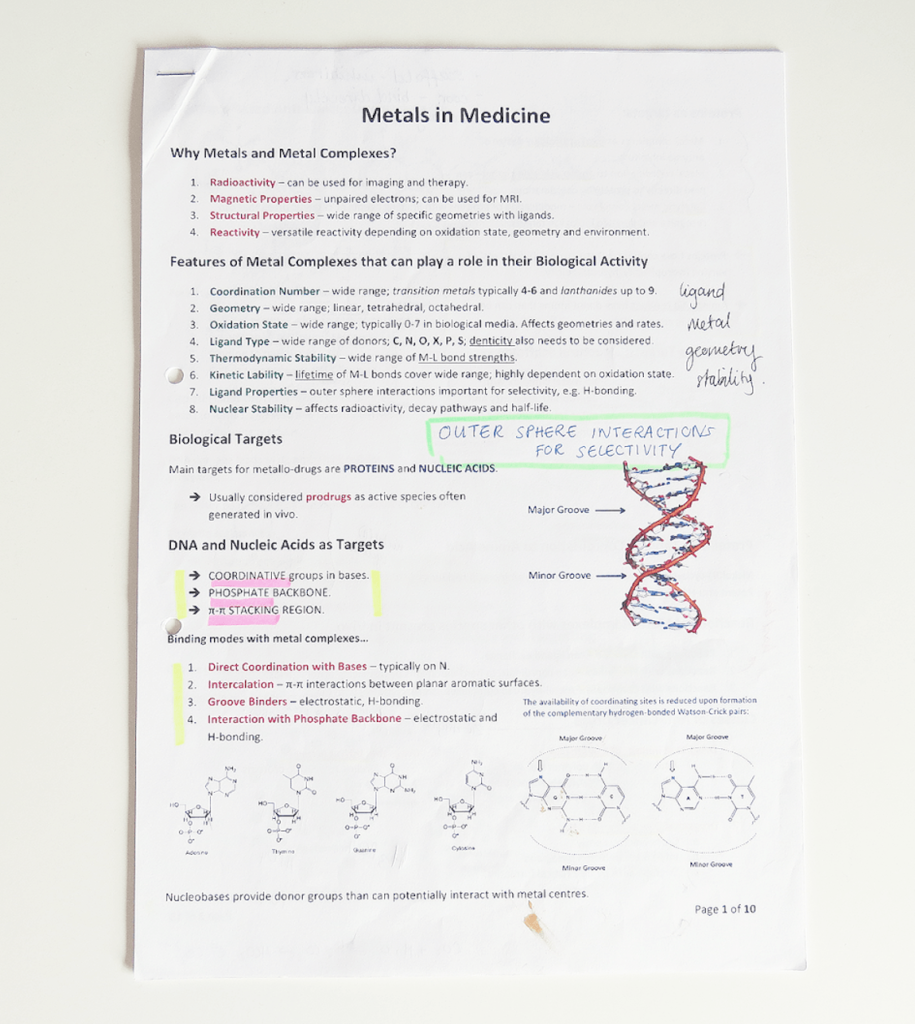Before I get into some common mistakes students make, I’ll begin by asking if you’re even keeping study notes for your subjects — you should be!
Notes are incredibly important, they will be your go to reference for the things you’ve learnt throughout the year.
The HSC is a year-long process! You need to remember things you might have learnt up to 10 months prior, you can’t expect to just keep all that information in your head.
It’s hard enough trying to keep the content for one subject in your head, let alone 10 units worth.
So with that said, let’s get into the three biggest mistakes students make once they decide to start keeping notes!
Mistake #1: Keeping all your study notes in one format
Mistake #2: Unorganised study notes
Mistake #3: Perfectionism
Mistake #1: Keeping all your study notes in one format
You shouldn’t keep all your notes in one format, you should try and have them in as many forms as possible. You should have notes typed, hand written, and in other forms of your choosing! Diversifying where you keep your notes has many benefits.
Write Notes By Hand
Writing notes by hand has the benefit of improved memory retention. It’s much easier to remember notes you’ve written by hand, than notes you’ve typed. There are countless studies proving the benefit of writing notes on paper.
It may take longer to write up your notes by hand, but having handwritten notes also allows you to have fun and get creative with your study!
You can use whatever format you like, and include diagrams or drawings to aid your revision — which is particularly useful for science subjects!
Pro tip: If you’re a visual learner, handwriting your notes and including lots of drawings and diagrams will help you incredibly while studying for your HSC!
Typing Your Notes
Typing your notes has the benefit of being able to easily format, and chop and change your notes. You can create tables of contents or an index, copy in detailed images, and search for text within your notes to find specific things. It’s incredibly valuable.
Typing your notes can also be quick and more accessible. If you have access to a laptop or tablet, you can take it with you and work on your notes wherever you may be! Typing your notes also allows you to easily add handwritten information once they’ve been printed.
Pro tip: Use Evernote to keep your notes synced and up to date on all of your devices, allowing you to access them anywhere!
Post-It Notes
Post-it notes are great for bite-sized pieces of information. Small facts you need to memorise, can be written on post-it notes and stuck on the wall.
Overtime you’ll memorise the facts, since they’re always in front of your face. This is especially useful for subjects where you have a lot of little facts or formulas to memorise, like dates for Modern History or formulas for Maths.
Pro tip: Post It notes are also great to use to summarise information as you’re reading it for mini summary notes! As you’re reading through your textbook, summarise the information you just read on a post it note and stick it on top of the section you read!
Mistake #2: Unorganised study notes
Organisation is the glue that holds your notes together — without it you’ll never be able to find what you need, you’ll get frustrated and the quality of your notes will deteriorate.
You need to have a system in place, so that you can find what you want when you want! We need a system that will work for the different types of study notes.
Always falling behind in class and on your study notes? Here are 4 HSC Classroom Habits you can use to stay ahead and organised!
Handwritten Notes
Writing notes by hand doesn’t have to have you hamstrung in terms of ordering.
Write notes for specific topics on a single pages, don’t write things from multiple topics on one page. This way if you need to change the order of things when you’re studying you just have to shuffle specific pages around, and the information is all still self contained.
To keep your handwritten notes together, you can keep your loose sheets of notes in display folders, or you can make your paper notes into a little book.
Typed Notes
Typing your notes is mostly easier than writing by hand, but even more efficient if you use Microsoft Word to its full potential!
When creating headings use the inbuilt word heading styles, don’t try and format each heading by yourself — this is a waste of valuable study time. Using the heading styles means if you decide to change the look at the end, all the headings will change automatically!
Want to make taking study notes 100x easier? Download our FREE HSC Notion Template for study notes which includes syllabus dot points to follow, a habit tracker, master list of past papers, assessment planner, and more!
Mistake #3: Perfectionism
The study notes are for you to remember things! They don’t need to be written in perfect English. The notes don’t even need to be completely coherent.
You should think about what you want to say, and literally write down your thoughts verbatim. Trying to perfect your notes on your first draft is a huge time sink, just write down whatever pops into your head!
The easiest way to do this is to begin by typing notes first, write down a rough copy. Once you have a rough copy of the things you want to say, you can go back, edit and type it again clearly and succinctly.
Pro-tip: Pretend the backspace key doesn’t exist — just get writing!
This will get you into the habit of drafting. It’s okay to write something crappy, that’s the point of a draft. Once you write it down though, you’ll be able to identify what’s wrong with it, making it easier to fix as well! It also allows you a chance to review and revise the information, aiding your memory retention!
Hopefully you find these tips helpful! If you haven’t already started writing study notes, there isn’t a better time to start than now!
For those of you who have already developed a portfolio of study notes, consider going over them with these common pitfalls in mind, and see if you can make any improvements!
Check your notes against our how to guide to writing effective HSC Advanced Maths notes here.
Looking for some extra help with your HSC studies?
We pride ourselves on our inspirational HSC coaches and mentors!
We offer tutoring and mentoring for Years K-12 in a variety of subjects, with personalised lessons conducted one-on-one in your home or at one of our state of the art campuses in Hornsby or the Hills! We also provide support for tutoring in Blacktown.
To find out more and get started with an inspirational tutor and mentor get in touch today!
Give us a ring on 1300 267 888, email us at [email protected] or check us out on TikTok!
Vamsi Srinivasan is looking to uncover the next hidden truth of the universe. He was fascinated by the beauty of Physics and Mathematics during his HSC. Now, he’s in his third year of a dual degree in Physics/Computer Science. Vamsi wanted to share his passion for Maths and Physics and has been an Art of Smart coach for the past 3 years. He coaches students in Physics as well as all ranges of HSC Maths from General to Extension 2. In his spare time you can find him watching Tennis or listening to his favourite podcast ‘Hello Internet’.





